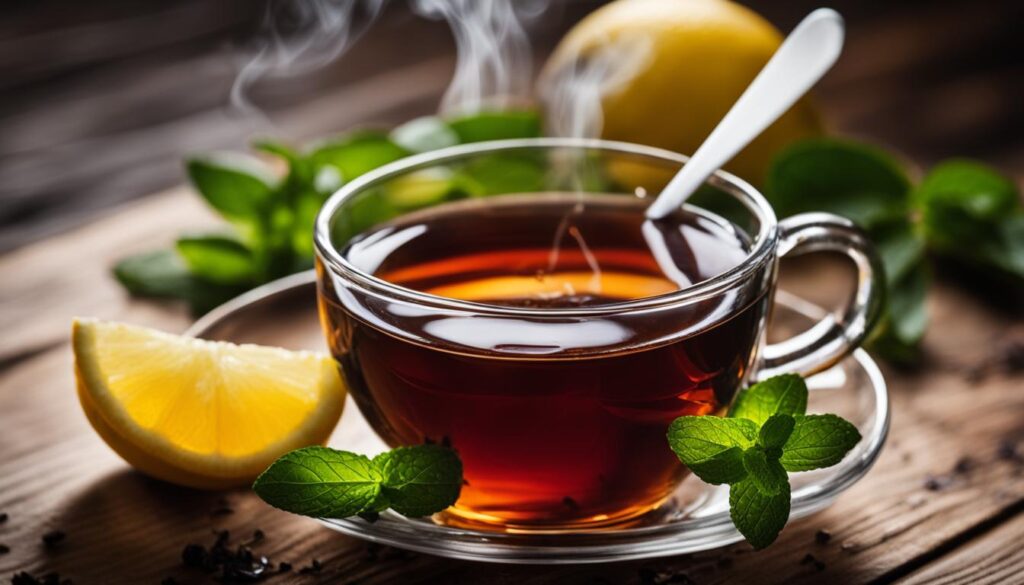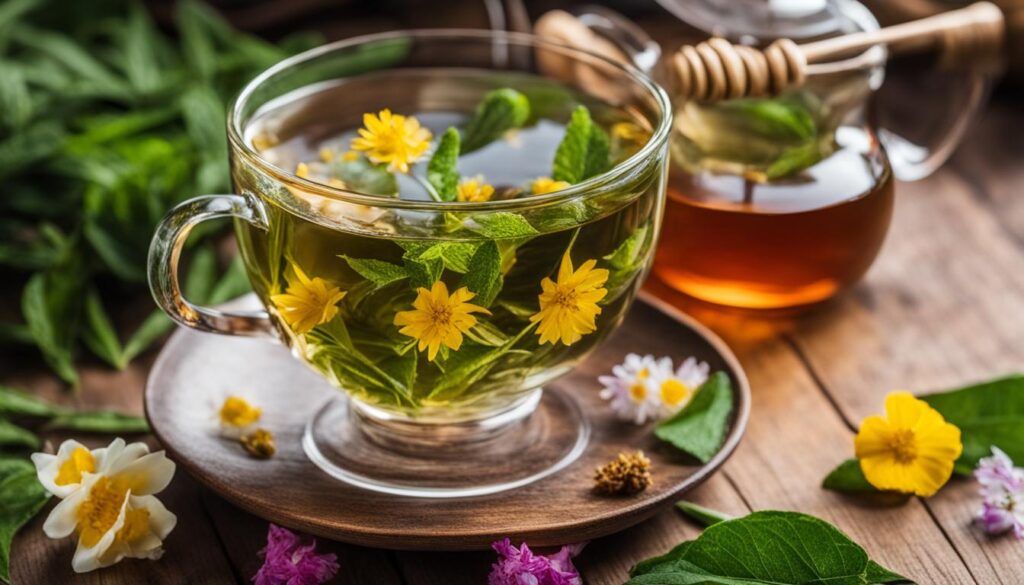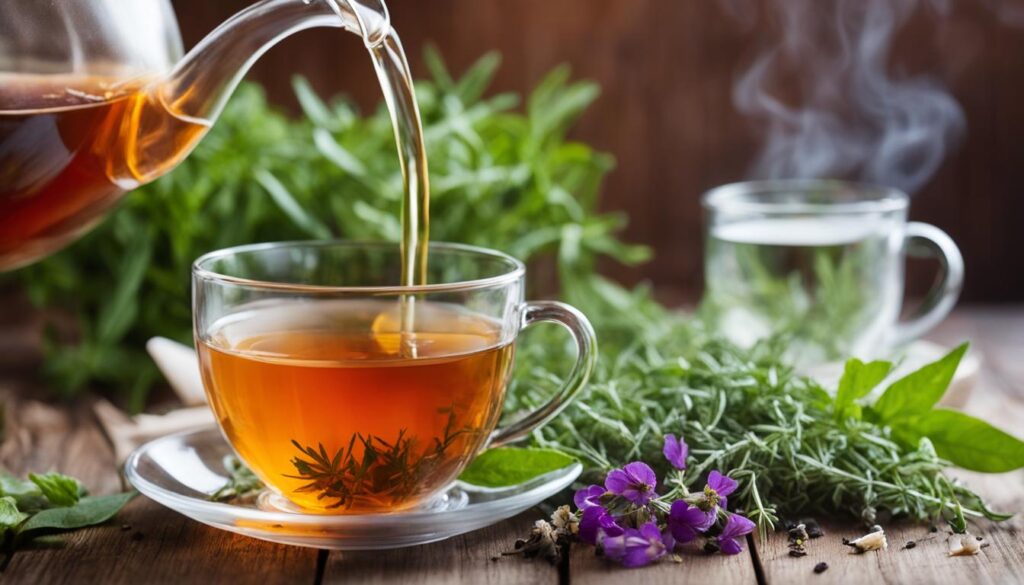Drinking tea has become a vital part of my daily routine, not only for its soothing and comforting properties but also for the amazing benefits it provides for my skin, particularly when it comes to acne. It’s incredible how a simple cup of tea can have such a positive impact on our health, both inside and out.
Throughout my acne journey, I discovered that tea can be a powerful natural remedy. By nourishing my body from within, tea helped improve my skin’s condition, clearing up blemishes and promoting a healthier complexion. Along the way, I explored different types of tea and learned about their specific benefits for acne-prone skin.
In this article, I want to share my personal tea experience and shed light on the many advantages it offers for individuals struggling with acne. We’ll delve into the specific teas that have worked wonders for my skin, their remarkable properties, and how to incorporate them into a beneficial skincare routine. So, if you’re ready, let’s embark on this journey together and explore the world of tea for acne.
Key Takeaways:
- Tea can have significant benefits for acne-prone skin, improving overall complexion and reducing blemishes.
- Drinking tea nourishes the body from within, resulting in healthier skin.
- Specific types of tea, such as peppermint, chamomile, rooibos, and green tea, offer specific benefits for acne.
- Herbal teas, like nettle leaf, holy basil, and dandelion root, can provide powerful remedies for acne.
- Tea can be incorporated into skincare routines through both internal consumption and topical application.
The Best Teas for Acne-Prone Skin
When it comes to improving acne-prone skin naturally, incorporating tea into your skincare routine can be a beneficial strategy. Different types of tea offer unique properties that can help address specific skin concerns. From balancing hormones to reducing inflammation, here are some of the best teas for acne-prone skin:
1. Peppermint Tea and Spearmint Tea
Both peppermint tea and spearmint tea can be excellent choices for hormonal acne. These teas have the potential to balance hormones and reduce excess sebum production, contributing to clearer skin.
2. Chamomile Tea
Known for its stress-relief properties, chamomile tea can support better skin health by helping to alleviate stress. By reducing stress levels, chamomile tea may have a positive effect on acne-prone skin.
3. Rooibos Tea
Rich in antioxidants, rooibos tea can help prevent and reverse skin aging. By fighting off free radicals, this tea contributes to a healthier complexion and may reduce acne-related inflammation.
4. White Tea
White tea contains high levels of antioxidants, making it a valuable addition to a skincare routine for acne-prone skin. These antioxidants can help slow down the skin-aging process and protect against environmental damage.
5. Jasmine Tea
Jasmine tea is known for its ability to reduce oily skin. Whether consumed or applied topically, this tea can help control excess oil production, which is often associated with acne-prone skin.
6. Green Tea
Green tea is a popular choice for its numerous health benefits, including its ability to reduce inflammation. When it comes to acne-prone skin, green tea can help calm irritated skin and protect against sun damage.

Including these teas in your daily routine can support your journey to clearer and healthier skin. Whether sipping a cup of tea or applying it topically, these natural remedies can make a difference in your acne-prone skin.
The Power of Herbal Teas for Acne
Herbal teas are a powerful and natural remedy for acne. They offer a range of benefits for the skin and can help improve its overall health. Let’s take a closer look at some of the most effective herbal teas for treating acne:
-
Nettle Leaf Tea
Nettle leaf tea is packed with essential nutrients like calcium, potassium, magnesium, vitamin C, and B vitamins, which are nourishing for the skin and hair. This tea also has the ability to block DHT, an active androgen known to cause acne.
-
Holy Basil (Tulsi) Tea
Holy basil tea, also known as Tulsi tea, is a powerful adaptogen that helps balance cortisol levels, blood sugar, and reduce anxiety. By reducing stress and regulating hormones, this tea can contribute to clearer skin.
-
Spearmint Tea
Spearmint tea has been shown to be particularly effective in reducing acne in women with PCOS. It helps lower testosterone levels, improving hormonal balance and reducing the occurrence of breakouts.
-
Green Tea
Green tea contains EGCG, a potent antioxidant that has anti-inflammatory properties and helps balance hormones. It can also increase sex hormone binding globulin (SHBG) levels, which can reduce the effects of androgens on the skin.
-
Dandelion Root Tea
Dandelion root tea supports liver detoxification, which is important for promoting healthy skin. By aiding the liver in removing toxins from the body, this tea can help reduce acne flare-ups.
-
Chamomile Tea
Chamomile tea provides relaxation for the nervous system, which can help reduce stress and inflammation in the body. This soothing tea promotes overall well-being, which reflects in the health of the skin.
-
Rosehip and Hibiscus Tea
Rosehip and hibiscus tea are rich in antioxidants and vitamin C, which are essential for promoting skin healing and preventing premature aging. These teas support overall skin health and can contribute to a clearer complexion.
By incorporating these herbal teas into your daily routine, you can take advantage of their powerful properties and enhance your acne treatment naturally.

| Herbal Tea | Benefits |
|---|---|
| Nettle Leaf Tea | Nourishes the skin and hair Blocks DHT |
| Holy Basil (Tulsi) Tea | Helps balance cortisol levels Regulates blood sugar Reduces anxiety |
| Spearmint Tea | Reduces testosterone levels in women with PCOS |
| Green Tea | Reduces inflammation Balance hormones Increases SHBG levels |
| Dandelion Root Tea | Supports liver detoxification |
| Chamomile Tea | Provides relaxation for the nervous system |
| Rosehip and Hibiscus Tea | Packed with antioxidants and vitamin C |
How to Incorporate Tea into Your Skincare Routine
There are different ways to incorporate tea into your skincare routine. You can drink herbal teas to enjoy their skin benefits from the inside-out. Steeping 1 teaspoon of herb or a tea bag in 1 cup of water for 15 minutes and drinking 2-4 cups of herbal tea per day is recommended. Additionally, you can apply tea topically by using tea bags directly on the skin or creating DIY skincare products with tea extracts.
Drinking herbal tea is a simple and effective way to reap its skin-healing benefits. You can choose from a variety of teas, such as chamomile, green tea, or rooibos, depending on your specific skin concerns. Herbal teas are packed with antioxidants and other beneficial compounds that can help reduce inflammation and promote a healthy complexion.
Steeping herbal teas is easy. Simply boil water, pour it over the tea bag or loose leaf herbs, and let it steep for about 15 minutes. Strain the tea and enjoy it warm or chilled.
Topical application of tea can also be beneficial for your skin. For a quick and soothing remedy, place cooled tea bags directly on your skin. This can help calm inflammation, reduce redness, and tighten pores. You can also create DIY skincare products by infusing tea extracts into oils, lotions, or facial masks.
“Incorporating tea into my skincare routine has been a game-changer for me. It’s a natural and gentle way to treat my acne while nourishing my skin.”
DIY Green Tea Face Mask Recipe
If you prefer a DIY approach, you can create a green tea face mask at home using simple ingredients:
- Steep 2 green tea bags in boiled water for 5 minutes.
- Remove the tea bags and let them cool.
- Combine the cooled tea with 1 tablespoon of honey and 2 tablespoons of plain yogurt.
- Mix well to create a smooth paste.
- Apply the mask to your cleansed face and neck.
- Leave it on for 15-20 minutes.
- Rinse off with warm water and pat dry.
This green tea face mask can help soothe and hydrate your skin while providing it with antioxidants and antibacterial properties.
Remember, consistency is key when incorporating tea into your skincare routine. Drink herbal tea regularly and try topical applications to see the best results for your acne-prone skin.

Conclusion
Tea is a wonderful natural remedy for acne, offering a range of benefits that can help improve your skin’s health. Its properties, such as reducing inflammation and balancing hormones, make it an effective solution for those struggling with acne. By incorporating different types of herbal teas into your skincare routine, you can experience the multiple advantages they provide for acne-prone skin.
When it comes to selecting teas, it is essential to choose ones that address your specific skin concerns. Regularly drinking these teas will maximize their effects on your skin. Remember, taking care of your skin from the inside-out with tea is a holistic approach that can contribute to achieving and maintaining clear and healthy skin.
So why wait? Start sipping on tea and let its natural properties work their magic on your skin. Embrace the power of tea as a beneficial and soothing remedy for acne, and enjoy the many benefits it brings to your overall skin health.
FAQ
Is tea good for acne?
Yes, drinking tea can be beneficial for acne-prone skin. Tea has properties that can reduce inflammation, balance hormones, and promote overall skin health, which can help improve acne.
What are the benefits of tea for acne?
Tea can help with various skin conditions, including acne. It can improve hormonal balance, reduce excess sebum production, provide stress relief, slow down the skin-aging process, reduce inflammation, protect against sun damage, and nourish the skin with essential nutrients and antioxidants.
What is the best tea for acne?
There are several types of tea that are beneficial for acne-prone skin. Peppermint tea and spearmint tea can help balance hormones and reduce excess sebum production. Chamomile tea provides stress relief, while rooibos tea is rich in antioxidants. White tea can slow down the skin-aging process, jasmine tea is effective in reducing oily skin, and green tea reduces inflammation and protects against sun damage.
Can herbal teas help with acne?
Yes, herbal teas can be powerful remedies for acne. Nettle leaf tea nourishes the skin and hair, while holy basil (tulsi) tea helps balance cortisol levels and reduce anxiety. Spearmint tea can reduce testosterone levels in women with PCOS, and green tea contains antioxidants that reduce inflammation and balance hormones. Dandelion root tea supports liver detoxification, and chamomile tea provides relaxation for the nervous system. Rosehip and hibiscus tea promote skin healing and prevent aging.
How can I incorporate tea into my skincare routine?
There are different ways to incorporate tea into your skincare routine. You can drink herbal teas to enjoy their skin benefits from the inside-out. Steeping 1 teaspoon of herb or a tea bag in 1 cup of water for 15 minutes and drinking 2-4 cups of herbal tea per day is recommended. Additionally, you can apply tea topically by using tea bags directly on the skin or creating DIY skincare products with tea extracts.